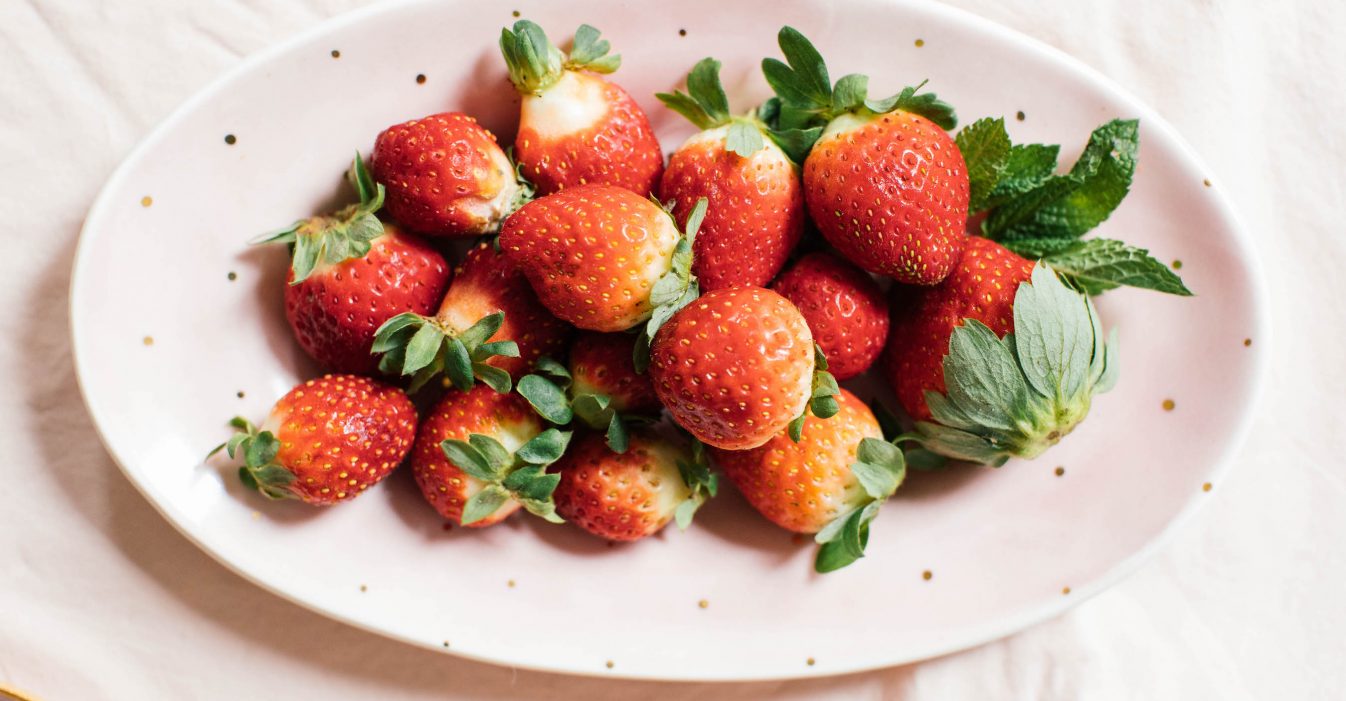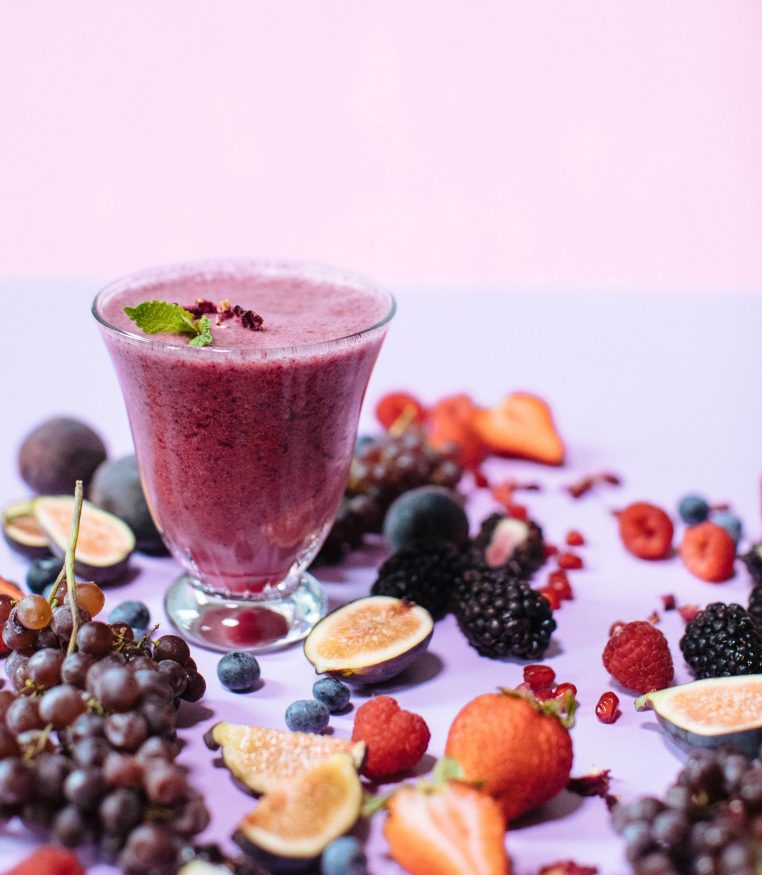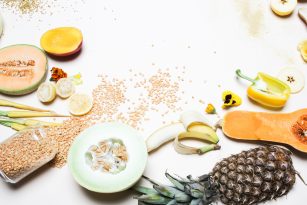Including a few servings of fruits for digestion in your daily diet is an easy and effective way to keep things moving through your digestive tract.
I chat a lot about ways to improve digestion with my clients, including how to make it more efficient, decrease bloating, promote regularity, and so much more. Believe it or not, it’s also a topic I love talking about. I mean hey, I went to school to talk about both the ins and outs related to our health, and digestion is a crucial topic that should be on your radar.
Optimizing digestion ensures that you’re getting the most nutrients from your diet to supply your body with the vitamins and minerals that it needs to function and thrive. It also ensures that your body is able to filter out and excrete waste products efficiently while also enhancing the health of the delicate gut microbiome.
Fiber is one of the most important nutrients when it comes to digestion. Fiber moves through the gastrointestinal tract undigested, helping to get things moving and promote regularity. Research suggests that fiber can also protect against several digestive disorders, including hemorrhoids, gastroesophageal reflux disease (GERD), stomach ulcers, and constipation. Plus, as a bonus, eating more fiber-rich foods may also come with other added health benefits, including improved insulin sensitivity, lower cholesterol levels, decreased blood pressure, and more (1).
Today, I wanted to share with you all some powerful fiber-rich fruits for digestion to start incorporating into your diet to help aid in a more regular system. Try swapping these fruits in for your favorite snacks or including them in recipes for an easy way to increase your intake of fiber and improve your digestive health.
Top 5 Fruits for Digestion
1. Raspberries
Just 1 cup of raspberries contains 8 grams of fiber, which is nearly a third of the fiber that most of us need for the entire day. Raspberries are also lower in sugar than most fruits, which can be a great choice for anyone watching their blood sugar levels, including diabetics or those on a fat loss plan.
Try sprinkling raspberries over yogurt, oatmeal, or cereal for a quick boost of flavor, fiber, and nutrients. If you’re feeling a bit more creative, raspberries also make a great addition to fruit jam, baked goods, smoothies, and salsas.
2. Apples
We’ve all heard the saying “an apple a day keeps the doctor away.” This phrase is often used by parents all over the world to get their little ones to eat fruit, but it turns out it really does have something to it! Having a healthy digestive tract is imperative for overall health. After all, it’s how our bodies absorb and utilize all those amazing nutrients we consume.
Apples contain a unique type of fiber called pectin, which has been shown to help improve digestion because of its soluble nature and ability to bind to cholesterol or toxins in the body and promote their excretion (2). A medium apple also contains about 4.4 grams of fiber, which is about 17% of the amount you need for the entire day. Additionally, apples contain a host of other nutrients, including vitamin C and potassium.
Apples are an easy and portable snack that can be enjoyed on the go. Apples pair especially well with nut butters to increase your intake of protein and healthy fats. Alternatively, try making apple crisps, apple butter, or applesauce to add a bit of variety to your diet.
3. Figs
Figs are one of my absolute favorite fruits that aid digestion, and I really feel these are a treat because they’re so delicious and sweet. One cup of dried figs contains roughly 15g of fiber. Although this is a serving larger than most people would typically consume, it should give you an idea of why it’s considered one of the best fruits for digestion. In fact, just one large raw fig contains 2 grams of fiber all on its own.
Figs are also loaded with antioxidants, which can help protect against cell damage and fight the formation of disease-causing free radicals in the body. Each serving also supplies a good amount of micronutrients like vitamin A, vitamin C, vitamin K, and potassium.
Need some simple ideas for how to incorporate figs into your weekly meal plan? Try adding figs to salads, sandwiches, in smoothies, or topped on porridges.
4. Prunes
Prunes are simply dried plums. Prunes are one of the most well-known fruits for digestion out there due to their natural laxative effect in the body. Interestingly, prunes contain a compound called dihydroxyphenyl isatin, which helps stimulate the intestines to contract and move (3).
Prunes also provide a great amount of both soluble and insoluble fiber, which helps the body get rid of waste, add bulk to the stool, and keep things moving through the GI tract. Just one prune contains nearly one gram of fiber, which can help ramp up your intake of this essential nutrient very rapidly. Plus, they contain sorbitol, which loves water and will take any water it can get and push it in the digestive tract to make it easier to pass. To top it off, prunes contain loads of minerals like magnesium, which helps overall digestion because by relaxing the muscles in the digestive tract (4).
Besides enjoying this delicious dried fruit as is, you can also add it to oatmeal, trail mix, or savory soups and stews. Prunes also make an excellent high-fiber addition to smoothies, jams, or baked goods as well.
5. Bananas
Not only do bananas contain about 3-4 grams of fiber per serving, but they also contain that special fiber called pectin, which has been shown to help decrease and heal stomach ulcers in animal studies (5). Bananas also provide a healthy dose of prebiotics, which are used as quick source of fuel for the beneficial bacteria in the gut.
In addition to their fiber content, bananas are also rich in several other key vitamins and minerals as well. In particular, bananas are a great source of vitamin C, potassium, vitamin B6, and magnesium, all of which are essential to supporting both digestion and overall health as well.
Bananas add a tasty texture to pancakes and puddings. You can also try blending frozen ripe bananas with a bit of coconut milk, vanilla almond milk, sea salt, and a dash of cinnamon to make BanaNO-cream, a healthy twist on traditional, store-bought ice cream.
Bonus: Avocados
Avocados are on my list of fruits that help digestion, and, even though I categorize avocados as a healthy fat, they’re technically a fruit. Avocados contain high amounts of fiber as well as healthy fats to keep our digestion moving along and lubricated. They also provide electrolytes like potassium, which helps contract the muscles to keep things moving (6).
One cup of sliced avocados can provide 10 grams of fiber, knocking out around 40% of your daily fiber needs in a single serving. They are also rich in potassium, vitamin C, vitamin B6, and magnesium, along with protein and heart-healthy monounsaturated fats.
For a simple way to enjoy this nutrient-packed ingredient, try seasoning it with a bit of salt and pepper for an easy snack. Avocado can also be spread onto toast, made into guacamole, or used to top off salads, soups, and sandwiches while bumping up the content of healthy fats.
Top Fruits for Digestion Recipes
Need some ideas for how to up your intake of these nutritious and delicious fruits? Here are a few tasty recipes that feature fruits good for digestion, along with an assortment of other gut-healthy ingredients:
- Ultimate Berry Smoothie Bowl
- Avocado Asparagus Gazpacho
- Raw Caramel Apple Nachos
- Sesame Seed Prune Balls
- Banana Yogurt
Put This Into Practice
There are several different options for boosting your digestive health through your diet, and incorporating a few servings of gut-friendly fruits into your meal plan is a great place to start. Try adding these fruits to your breakfast, swapping them into your snack time, or using them in your favorite desserts. There are limitless ways to enjoy, which makes it easy to take advantage of the unique health benefits that these ingredients have to offer.
Keep in mind that increasing your fiber intake too rapidly can cause digestive side effects like bloating, gas, and stomach pain. Therefore, it’s best to introduce these fruits for digestion to your diet gradually, including a few servings per day to make sure you’re able to tolerate them. Additionally, be sure to also stay well-hydrated. Drinking enough water can help the fiber move through your body efficiently to promote regularity and support digestive health. Aim to drink between 8-12 cups per day to stay hydrated and optimize overall digestion.
If you’re looking for more support and ways to integrate more fruits for digestion into your diet, then check out our best-selling Online Education Programs. We offer programs to give you the tools you need for meal planning, learning how to stock your kitchen, give your body a reset with whole foods, and more. Click here to explore what programs are right for you. Or if you’re ready to get started now with making Healthy Eating Simple, then taking our free 4-part series, click here to join!








